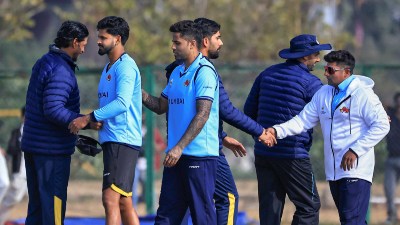The future of freedom
In the end, Pervez Musharraf, America8217;s favourite 8216;dictator8217; had just no options, or backers, left to strike back.

In the end, Pervez Musharraf, America8217;s favourite 8216;dictator8217; had just no options, or backers, left to strike back. He was forced to resign, and the forces of democracy have won a stunning victory. As the euphoria wears off, the questions remain: 8216;where will Pakistan head now?8217; Over the last 50 years, the country has seen 33 years of military rule by four army dictators. Each time it took many years, and much sacrifice, before the forces of democracy prevailed. Gen. Ayub Khan, took over in 1958 and resigned in 1969 after street demonstrations for fair elections brought the country to a halt. He passed the baton to his chief of staff, Gen. Yahya Khan, who held the promised elections, but refused to hand over to the majority party of the Bengali leader Sheikh Mujeebur Rehman, and was forced to resign after the disaster of Bangladesh.
The third dictator, Gen. Zia ul Haq, removed and hanged the Peoples8217; Party leader Z.A. Bhutto, and with obvious American assistance, injected Islamic fundamentalism to combat the Soviet invasion of Afghanistan. Once the task was done, 8216;fundamentalism8217; was to plague Pakistan, and later the entire world. In the end his handlers proved his destroyers. Democracy followed as PMs Benazir Bhutto and Nawaz Sharif treaded carefully with fundamentalist forces. Gen. Musharraf used the economic malaise that followed the rise of fundamentalism to take over in a fake 8216;hijacking case8217; against Nawaz Sharif. The events of 9/11 came to his assistance and the USA came to his aid, only to abandon him when democratic forces turned on him. Ironically, the US was seen, once again, as the greatest obstacle to a democratic Pakistan. What is to follow, and how will it impact India? These are questions of immense import for India and the region.
Pakistan, for the first time, is experiencing 8216;coalition politics8217;. For this reason the problems within the country are of greater importance than any external threat 8212; the classic excuse used to halt the democratic process. Uppermost in the mind of the average Pakistani will be restoring the judges dismissed by Musharraf to prevent them ruling on his eligibility to run for the election of the presidency while still a serving army chief. By any standard it was an unprecedented action and proved to be the catalyst that brought about this resignation yesterday. The 8216;black coat8217; revolution of Pakistan8217;s lawyers brought out the finest of the democratic forces on the streets.
The coalition government has promised their restoration within 72 hours. Will that happen? There is every reason to doubt that the new rulers of Pakistan will honour their commitment to follow the rule of law. The leaders of the two main parties in power fear a free and strong judiciary, and the greatest threat to future stability stems from this. If, however, Nawaz forces the promised restoration of the judges on the PPP, the future actions of the judiciary will stabilise a free and democratic Pakistan. This is, in a way, the litmus test for Pakistan, for life and business had been stifled by the unending tension that the presence of Musharraf had generated.
For India three major questions will remain uppermost on the minds of analysts. How will Pakistan move on the Kashmir question? How will this affect the move to improve trade relations? How will Pakistan play its role in the 8216;war on terrorism8217;? All three questions have a common root 8212; the question of the growing 8216;trust deficit8217; between the two. India, with some justification, blames the rise in unrest in the disputed state on moral and material help the Kashmiris receive from Pakistan. Pakistan, again with some justification, blames India for their troubles in the province of Baluchistan, which, directly, weakens their efforts to tackle 8216;Islamic militancy8217; in their north-west frontier province, which impacts NATO efforts in Afghanistan. With or without Musharraf, Pakistan8217;s fight against Islamic fundamentalism needs the assistance and support of India, Afghanistan and the USA.
It is clear that irrespective of what the Indian government wants or wishes, the Americans have little option but to keep investing in Pakistan. This is a 8216;long-term8217; fight that has to be won, no matter what the cost. No matter what the hard-core 8216;haters8217; might say or want, it is important that the governments of both India and Pakistan move forward from their polarised positions on Kashmir and reach a solution that will relax the entire subcontinent towards greater economic growth.
As Pakistan grapples with its internal fight to consolidate democracy, it makes sense that the Indian government passes on to its neighbour the lessons of coalition politics; and for Pakistan to be an economic success story, the fundamentals for which are very much in place. Failure to understand this fact could affect the rise of a new vibrant India. Terrorism and economic recovery cannot be tackled alone. The next few days will determine how Pakistan moves, how the 8216;black coat revolution8217; goes forward, and how a free Pakistani press forces its politicians to stick to the path of democracy. It is a hard won victory, and one that will, surely, this time keep Pakistan on course.
The writer is a columnist with 8216;Dawn8217;
- 01
- 02
- 03
- 04
- 05






























